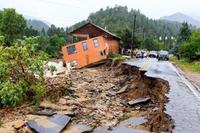-
Colorado faces costly, lengthy challenge fixing flood-damaged roads

The Colorado Department of Transportation(CDOT) has met the 1 December 2013 deadline to reopen twenty-seven flood-battered highways in the state, but the department still faces major challenges in making permanent fixes to damage caused by September’s historic floods. The scope of the task is currently being evaluated as highway managers explore technological and engineering changes needed to keep about 485 miles of damaged roadway more resistant to mass flooding.
-
-
New Silicon Valley focus on cybersecurity
The last time Silicon Valley focused on cybersecurity was in the 1990s. That focus saw the emergence of two giants: McAfee and Symantec. The two companies remain the most recognizable household names, thanks to their traditional firewall and anti-virus products. Now they find the arena which they thought was their own encroached from two sides. On one side there are tech giants like Hewlett-Packard and Cisco Systems, which see new revenue opportunity in cybersecurity. On the other side there is a rush of start-ups backed by large investments of venture capital.
-
-
EU issues new manual for defending ICS against cyberattacks
ENISA, the EU’s cybersecurity agency, has issued a new manual for better mitigating attacks on Industrial Control Systems (ICS). ICS support vital industrial processes primarily in the area of critical information infrastructure such as the energy and chemical transportation industries, where sufficient knowledge is often lacking. As ICS are now often connected to Internet platforms, additional security preparations must be taken. ENISA says that the new guide provides the necessary key considerations for a team charged with ICS Computer Emergency Response Capabilities (ICS-CERC).
-
-
Federal IT spending to exceed $11 billion by 2018
A new report from Delteks, contracted spending on cybersecurity will continue to grow from nearly $9 billion in FY2013 to $11.4 billion in FY2018, driven by multiple initiatives aimed at improving the overall cybersecurity posture of federal agencies. Persistent threats, complex and evolving policy issues, and changing technologies highlight ongoing cyber-workforce shortages to drive investments despite constrained federal IT funding.
-
-
NSA planted sleeper malware in 50,000 computer networks
The NSA has planted 50,000 sleeper malware packages – in effect, digital sleeper agents – in more than 50,000 computer networks around the world. The agents, controlled by the NSA’s Tailored Access Operations (TAO) unit, can be activated on command to harvest information of cause disruption. To plant the digital agents, the NSA employed methods typically used by Internet scammers and fraudsters.
-
-
Lawmakers: Old plastic gun law has not kept pace with technology
The U.S. House of Representativesvoted last Tuesday to renew the 25-year old Undetectable Firearms Actwhich prohibits firearms that can evade metal detectors and X-ray machines. Law enforcement agencies say that developments in 3D printing make the law insufficient, and lawmakers who proposed amending the Act say that the only way to make such guns detectable is to require that at least one component of the firing mechanism in a plastic gun contain enough metal to be detectable in a magnetometer — and that that component be undetachable. The NRA opposes these requirements, saying that they would infringe on the Second Amendment rights of citizens.
-
-
U.S. aircraft to fly African troops to the Central African Republic mission
U.S. military aircraft will fly African and European peacekeepers to the Central African Republic to help contain a bloody internal conflict between Christian and Muslim militias and other rebel factions. The country has been in chaos since Muslim militias ousted President Francois Bozize in March. The initial mission of the U.S. transport planes will be to fly troops from Burundi to the Central African Republic capital of Bangui.
-
-
Texas terror case may hinge on reason for a FISA warrant
The Foreign Intelligence Surveillance Act (FISA), passed in 1978, was the center of a Fifth Circuit Court of Appeals trial last Thursday in New Orleans. The case involves Khalid Ali-M Aldawsari, a former Texas Tech student serving a life sentence for an attempted use of a weapon of mass destruction. At trial, federal prosecutors described Aldawsari as a “lone wolf” terrorist planning to wage a personal “holy war” from Lubbock, Texas. In the application for the warrants, however, prosecutors identified Aldawsari to a FISA court judge as an “agent of a foreign power.”
-
-
Airport scanner vendor failed to disclose use of Chinese components
Recently TSA cancelled a $60 million contract with Rapiscan Systems, a manufacturer of anatomically revealing airport security scanners, after Rapiscan was found to be using unapproved Chinese components in its scanners – and failing to disclose this fact to TSA. Rapiscan, in bidding on the contract, submitted a list of U.S.-made components used in the scanners to the agency, as required by law. After the company received an approval of that list – and the $60 million contract – it ordered the same components from a Chinese company — the Shanghai Advanced Non-Destructive Testing – instructing the Chinese company to label the Chinese-made components with the same part numbers as the originally approved, U.S.-made components, apparently in an effort to make it more difficult for TSA inspectors to notice the illegal switch. Members of the House Homeland Security Committee, charging that the use of Chinese components made the machines susceptible to sabotage, disruption, or spying, want to know whether TSA was aware of Rapiscan’s shenanigans.
-
-
Prolonged viewing of terrorist incident media coverage tied to acute stress

Stepping away from the television, computer screen or smartphone in the aftermath of terrorist attacks or mass shootings may be beneficial to your mental health. This is the takeaway from a new study showing that six or more daily hours of exposure to media coverage of the Boston Marathon bombings in the week afterward was linked to more acute stress than having been at or near the marathon. Acute stress symptoms increased with each additional hour of bombing-related media exposure via television, social media, videos, print, or radio.
-
-
Feds, Calif. disagree on seismic safety of U.S. tallest dam

At 742 feet, Oroville Dam in Oroville, California is the tallest dam in the United States. It is 45-year old, and federal inspectors say it needs a comprehensive earthquake safety assessment. The California Department of Water Resources (DWR) insists that the dam, which holds 3.5 million acre-feet of water, is safe, and that such an assessment would be an “unjustified expense.” David Gutierrez, chief of California Division of Safety of Dams (DSD), says his agency will decide in January 2014 whether earthquake assessments will be made, but notes: “Oroville is not one that keeps me up at night from a seismic stability standpoint.”
-
-
Is the time finally right for a pan-African security force?
Representatives of fifty-three African states, meeting at an African summit in Paris last week, emphasized the need for a pan-African military force. Observers note that this is not a new idea – it was first raised Ghana’s first president Kwame Nkrumah in 1963 — but that on those few occasions when efforts were made to translate the idea into reality, it has never worked. Notwithstanding the many failures of the past, and the many warning signs of the present, many African leaders and observers are optimistic that this time, the 50-year old dream of a pan-African military force may well be realized.
-
-
Game theory helps corporate risk manage analyze terrorism risks
The challenges of modeling and analyzing terrorism risk are based on the reality that the adversary is one who can alter where and when to strike and has the capability to counter-attack. Before 9/11, the science of risk modeling and analysis for corporations was primarily based on data accumulated from Mother Nature, a less responsive actor. Risk models have become more precise, but this increased precision notwithstanding, terrorists are likely to act in unexpected ways. To anticipate those unexpected ways, risk managers are relying on game theory, with the assumption that exploring hypothetical situations will prepare risk managers for the unexpected.
-
-
U.S., U.K. intelligence worried about Snowden’s “insurance policy” cache
Edward Snowden has so far released about 500 of the classified documents he secretly downloaded while working for an NSA contractor. Source familiar with the case say he had downloaded between 50,000 and 200,000 classified NSA and British government documents. Those close to him suggest that in addition to continuing a steady release of secret documents over the next two to three years, the potentially most damaging information he obtained, information which includes the names of thousands of intelligence agents and informers employed by the United States and its allies, is kept in a secret cache as an insurance policy against arrest or physical harm.
-
-
Surveillance programs prompt start-up entry into privacy protection market
Revelations of the surveillance programs of the National Security Agency(NSA) and the U.K. Government Communications Headquarters(GCHQ) have sparked technical innovations, legal challenges, and pursuits of political reforms in the United States and Britain. While some established providers of secure e-mails have bowed out, new companies are moving in to offer consumers protection from prying.
-
More headlines
The long view
What Does Netflix’s Drama “Adolescence” Tell Us About Incels and the Manosphere?
While Netflix’s psychological crime drama ‘Adolescence’ is a work of fiction, its themes offer insight into the very real and troubling rise of the incel and manosphere culture online.
A Shining Star in a Contentious Legacy: Could Marty Makary Be the Saving Grace of a Divisive Presidency?
While much of the Trump administration has sparked controversy, the FDA’s consumer-first reforms may be remembered as its brightest legacy. From AI-driven drug reviews to bans on artificial dyes, the FDA’s agenda resonates with the public in ways few Trump-era policies have.
The Center Can Hold — States’ Rights and Local Privilege in a Climate of Federal Overreach
As American institutions weather the storms of executive disruption, legal ambiguity, and polarized governance, we must reexamine what it means for “the center” to hold.
How to Reverse Nation’s Declining Birth Rate
Health experts urge policies that buoy families: lower living costs, affordable childcare, help for older parents who want more kids
Foundation for U.S. Breakthroughs Feels Shakier to Researchers
With each dollar of its grants, the National Institutes of Health —the world’s largest funder of biomedical research —generates, on average, $2.56 worth of economic activity across all 50 states. NIH grants also support more than 400,000 U.S. jobs, and have been a central force in establishing the country’s dominance in medical research. Waves of funding cuts and grant terminations under the second Trump administration are a threat to the U.S. status as driver of scientific progress, and to the nation’s economy.
The True Cost of Abandoning Science
“We now face a choice: to remain at the vanguard of scientific inquiry through sound investment, or to cede our leadership and watch others answer the big questions that have confounded humanity for millennia —and reap the rewards.”
